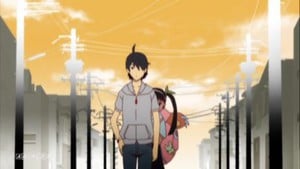Bakemonogatari
Episode 4
by Nick Creamer,
 At last, we've arrived at the heart of Mayoi Snail, an arc famed for its lack of basically all narrative action. This episode certainly lives up to its reputation - in the course of twenty-two minutes, it features Araragi and company wandering around the suburbs, deciding they're lost, and then calling on Oshino for help. It livens that total absence of “events” (which isn't necessarily a flaw) with rambling conversations between Araragi and Mayoi. It's essentially one long intake of breath between this arc's actual meaningful actions.
At last, we've arrived at the heart of Mayoi Snail, an arc famed for its lack of basically all narrative action. This episode certainly lives up to its reputation - in the course of twenty-two minutes, it features Araragi and company wandering around the suburbs, deciding they're lost, and then calling on Oshino for help. It livens that total absence of “events” (which isn't necessarily a flaw) with rambling conversations between Araragi and Mayoi. It's essentially one long intake of breath between this arc's actual meaningful actions.
It was this wasteland, more than the fanservice or idiosyncratic style, that initially almost knocked me off the Monogatari train. Episodes like this felt like a chore, and returning to it a second time hasn't really improved the experience. Monogatari's pacing is glacial at the best of times, and when its conversations lack much emotional consequence (which isn't generally true, as the first arc demonstrated), it can be a tough show to get through.
That said, the episode still offers plenty to dig into. The breakout “character” of this episode might well be Monogatari's suburbs, expanding in rows of faceless houses in all directions. Monogatari's general emphasis on street signs and impersonal buildings is perfectly suited to an arc about finding yourself lost in the suburbs. Power lines hang ominously overhead, echoing a sense of suburban alienation as they do in so many anime (Serial Experiments Lain, The Flowers of Evil, etc). At one point, a twangy steel string guitar implies the suburbs are their own kind of barren old west, street signs looming like lonely cacti in the afternoon heat.
This episode's focus on Araragi and Mayoi's rapport also lets it continue to sculpt characters and their relationships through volume, letting details accumulate in order to create a more complex and human dynamic. Araragi, Senjougahara, and Hanekawa all establish distinctive rapports with Mayoi that reflect their own personalities. Araragi deals with a kid essentially by becoming a kid himself; he follows through on her silly word games and ends up in a physical scuffle once again. Senjougahara is as brittle and defensive as ever, claiming she hates kids because she doesn't know how to act around them. Hanekawa offers the most traditionally mature perspective, using her natural air of authority to get Mayoi to apologize to Araragi. Of course, the fact that Hanekawa appears here at all says something else about her character - like the petulant Araragi, the abused Senjougahara, and the divorce-affected Mayoi, she also seems to be avoiding her home on Mother's Day.
But more than anything, this episode seems intent on making us care about Mayoi herself. Mayoi comes across as a believable kid, offering a mixture of precocious know-it-all and credulous child. She has specific hobbies, like tongue-twisters and other word games. She's combative but also trusting, and she feels insecure about her family's divorce. She seems worried about not reaching her mother, but her fear is tinged with fatalism - “it hasn't worked before, it's not going to work now, I'm never going to get home.”
Establishing Mayoi as a human character doesn't exactly justify this episode's lack of intrigue, but it at least offers some consolation. This was a tough episode to sit through, I know. Don't worry, things will get more dramatically terrible soon enough.
Overall: C
Bakemonogatari is currently streaming on Crunchyroll.
Nick writes about anime, storytelling, and the meaning of life at Wrong Every Time.
discuss this in the forum (96 posts) |
back to Bakemonogatari
Episode Review homepage / archives